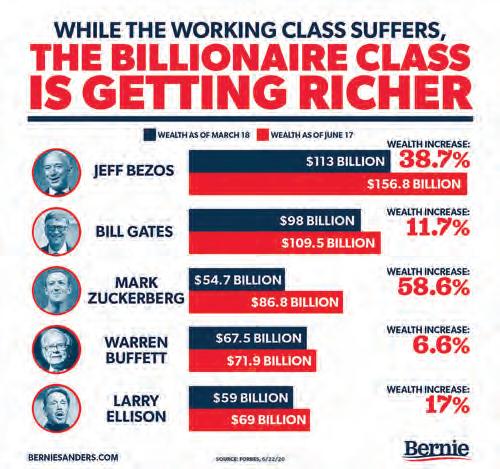
4 minute read
No, We're NOT all in This Together
No, We're NOT all in This Together When will we pay heed to Maya Angelou’s simple premise, “We are more alike, my friend, than we are unalike!”
BY ABDUL CADER ASMAL
Advertisement
Just over 50 years after Rev. Martin Luther King Jr. warned Americans of the triple evils — racism, economic exploitation and militarism — that would upend the world, the Covid19 pandemic has brought the country to the tipping point and generated worldwide economic devastation.
Hitherto, many contended that unrestrained materialism powered by unbridled capitalism would guarantee a brighter future with better incomes, job security, paid sick leave, possibly free higher education and a call for Medicare for all. Now, courtesy of the global pandemic, our country has a record unemployment rate, with people struggling to live from paycheck to paycheck until bailouts of socialistic dimensions were proclaimed.
And yet the needs of the homeless, the hungry and the forgotten remain largely unmet. What Dr. King failed to foresee was that in the world’s richest country, handing public health services over to profiteers or allowing health care to become a for-profit business forced many hapless people to die while languishing in isolation.
As history shows, an almost inevitable outcome of economic disaster is the hunt for a scapegoat. Once again, racism readily foots the bill. In typical Hollywood style, incidents are sensationalized by reducing them to the simplistic “good guys” vs. the “bad guys.”
In this case, given the deeply entrenched abyss of institutionalized racism, it is “police brutality” vs. the “Black Lives Matter” movement. As gut wrenching as the image of a law enforcement officer executing the very person he is supposed to protect is, it merely reflects the tip of the iceberg. In fact, it is tacitly endorsed by the nation’s powerbrokers, who have a vested interest in maintaining the status quo.
The Black man’s ordained “role” is to be “grateful” for his station in life. Despite significant upward mobility due to the Civil Rights movement, he is stereotyped as the backbone of a permanent underclass, consumed by poverty, mired in undesirable housing, oppressed by joblessness, challenged by poor educational opportunities and the victim of second-rate health care. Therefore, he “naturally” turns to drugs, which leads to gangsterism and culminates in Black-on-Black violence and an ensuing disproportionate level of incarceration. This
stereotype’s relentless reinforcement breeds self-doubt, frustration, despair and rage.
Perhaps the unkindest cut of all is that the Black community’s agenda is upended every time a new ethnic group is deemed a greater threat. This does not apply to the Native Americans, who were portrayed as heathens in desperate need of “salvation” and forced to give up most of their land just to stay alive, even if their almost complete extermination was the price to pay. For Black Africans, the stigma of slavery paved the way for demonization to contempt, for disrespect to tokenism.
Then came the Chinese, who were imported to build our railroads. Despite relentless bigotry, however, they could open businesses. After them came other perils: how to treat Japanese-American citizens during WW2, the influx of the less-than-desirable Europeans and the Jews, which created the new anti-Semitism that demanded immediate zero tolerance. The latest member of these “existential threats” is the mainstreaming of Islamophobia with its claims of “maniacal terrorists.” Now, it’s open season for pan-xenophobia.
But for Blacks, humiliation doesn’t end there. Every time a new socioeconomic issue arises — abortion rights, gay rights, samesex marriage, LGBTQ rights, gun ownership rights, along with the spending of obscene amounts on the military, the conquest of space and nuclear arms — their agenda is pushed to the backburner. Environmental devastation is allowed to continue, and the inner cities and national infrastructure are left to rot. Blacks, along with other discriminated-against minorities and the hitherto comfortable White middle class, need to recognize that the current system favors only the 2% of Americans who make up the elite. To be accorded our full constitutional rights, which mandates a social safety net for everyone, we have to form a coalition beyond the cliché “We’re all in this together.” Covid-19 has exposed the inequity of unadulterated profiteering, whose success is gauged by the stock market rather than the real income of those with full time jobs. Whether we like it or not, the “bailouts” were active acts of “socialism,” which is disparaged in the same breath as the unrelenting virus that has become an indispensable strand in our country’s post-pandemic fabric.
“The basic ideas of socialism took root in the great world religions... For socialism means, most basically, social justice, human moral decency, institutions and social practices based on love and compassion” (John Hicks 2004). We can refer to it as “social democracy,” “democratic capitalism” or “democratic socialism” in the best Nordic and German traditions. Covid-19 has given humanity a wake-up call that it’s time to find a way to balance the best of the “free market” with security for all.
The “militarism” personified by police brutality is sensationalized to portray all law enforcement officers as hostile to people of color, except insofar as the powerful see








